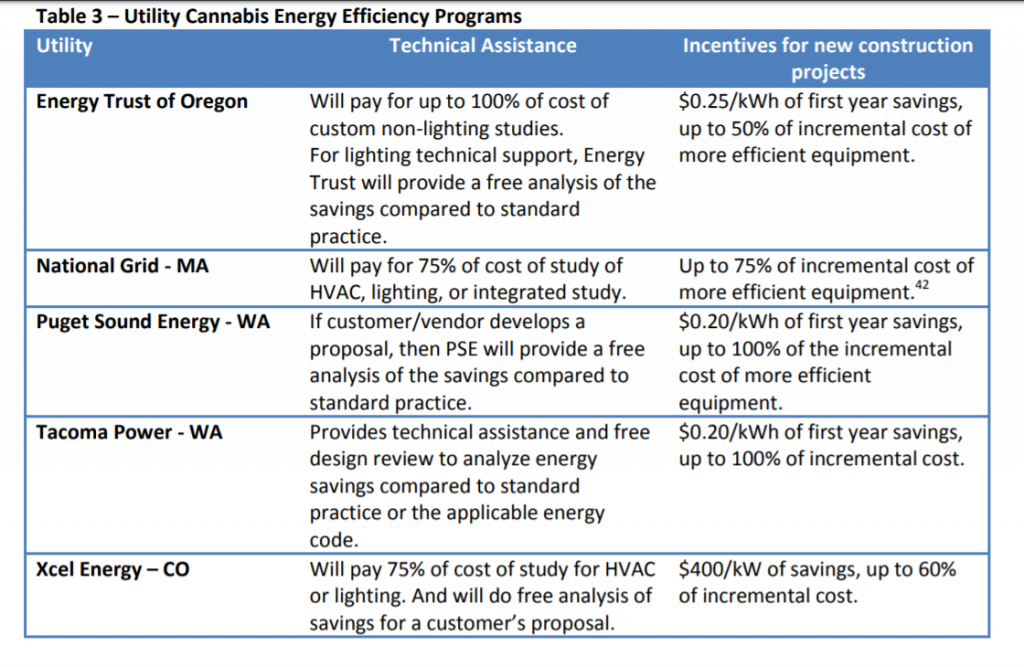Energy Companies Incentivize Growers

Energy Companies Want Cultivators to Increase Energy Efficiency
Cultivators are far too aware of the expense of running an indoor grow operation. Keeping an indoor operation humming 24/7/365 is expensive. As more Midwestern and Northern states legalize cannabis, energy grids are strained due to harsh winters and fluctuating humidity. With high startup costs, the sticker shock of purchasing methods that are more efficient may push cultivators to seek out cheaper alternatives. Unfortunately, these alternatives are also energy hogs and their total energy consumption costs could outweigh their cheaper price tag.
To encourage cultivators to change to energy-efficient products, energy companies across the country are offering energy rebates and incentives. Some of the products available for rebates include smart thermostats and dehumidifiers. You can search by your zip code or by the product to scroll through the offerings online.
What the Different States and Regions Are Doing
Illinois, Michigan, and Massachusetts are some of the different states trying to lessen the burden on their energy providers.
Two energy companies in Michigan – Consumers Energy and Detroit Edison – are offering rebates for new construction and replacement units. Qualifying units need a minimum energy factor of 2.8 L/kWh. The A210V1, A320V1, A710V1, and A710V3 all qualify under this program.
Colorado and Oregon, two early adopters of legalization, have seen the impact of increased growth in cannabis operations. Colorado’s total energy consumption from indoor grow rooms grew from 1.5% in 2012 to 4% in 2018. Portland faced several blackouts due to increased energy demands from cultivators.
The Energy Trust of Oregon has its own webpage dedicated to cannabis rebates and incentives. It has established a minimum Energy Factor of 2.8 L/kWh required for dehumidifiers. The incentive is only for new units replacing older units and does require the grow room to operate year-round.
Other region-focused organizations have resources for cultivators seeking energy efficiency.
For example, the Midwest Energy Efficiency Alliance provides resources on different sustainability trends and rebates throughout the Midwest.
The Southwest Energy Efficiency Project works with several energy companies in the western region and one in Massachusetts. These states are asking cultivators to move toward energy-efficient products and are using rebates to incentivize cultivators to purchase products that are more efficient.

National Resources
Other national companies and organizations work with cultivators as well to find energy-efficient products and rebates.
The Research Innovation Institute provides a multitude of information on energy-efficient methods and products to help growers.
Another resource is the DesignLights Consortium® (DLC). This organization works closely with different state governments to certify products deemed energy-efficient. Illinois has said that products certified by the DLC are eligible for rebates.
Discuss Equipment Upgrades with Local Energy Companies
Continue to work with local organizations and national resources to curtail the initial startup costs or to find rebates to replace existing products. These energy-efficient products are cheaper over the life of the product and are better for the environment. Now is the time to seek out those resources as energy companies are looking to create less burdened grids.
Some growers have even implemented more sustainable methods like wind and solar energy to help offset costs. A Massachusetts-area grower runs on solar power.
Please note: Before purchasing any products, be sure to contact your local energy company to make sure your product is eligible for a rebate.
DIG DEEPER, GROW MORE
Get grow room solutions tailored to your exact needs. Take the next step by contacting a supplier today.
GET IN TOUCH